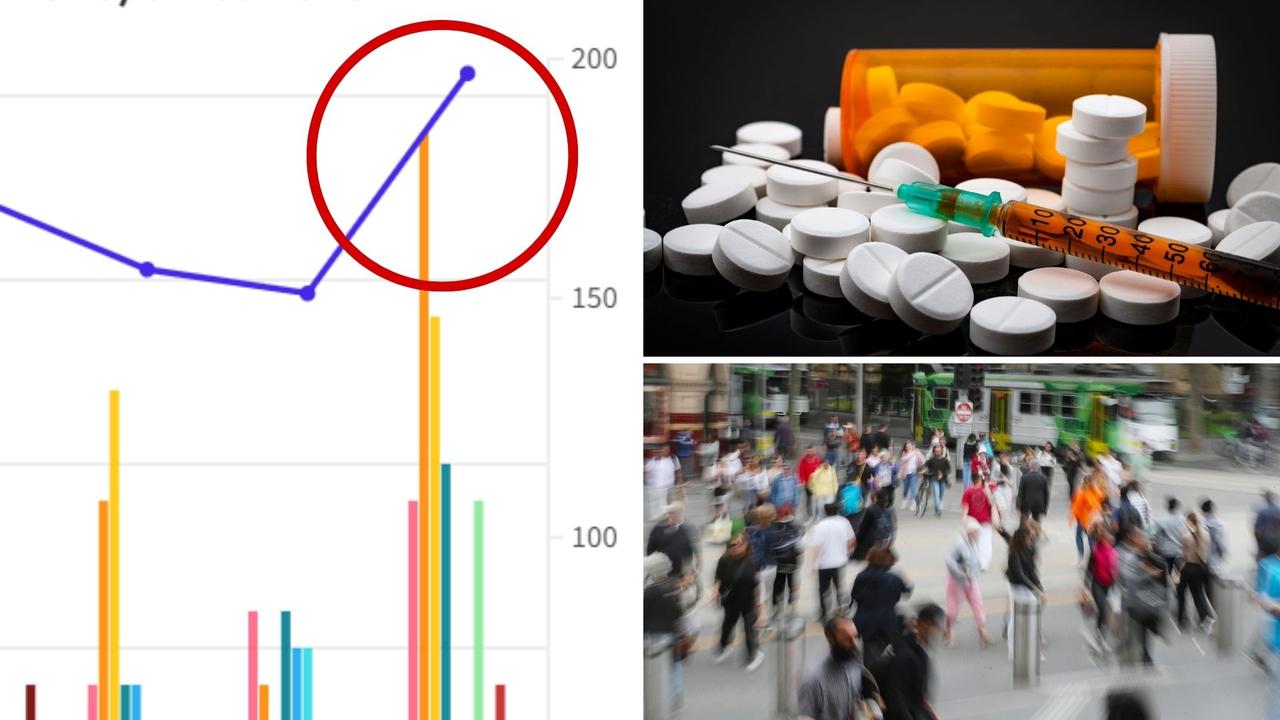Deaths from drug overdoses have risen to a decade-high in Victoria, according to alarming new figures that advocates say are a “wake-up call” for policy makers.
A new report from the Coroners Court of Victoria revealed there were 4887 overdose deaths in the state between 2013 and 2022, and 549 of those occurred last year.
Overdose deaths increased by nearly 10 per cent – up from 500 deaths in 2021 – and almost 80 per cent of deaths involved multiple drugs.
Victorian State Coroner told ABC Radio Melbourne that drug users were often mixing illegal and pharmaceutical drugs with alcohol in an “ongoing cocktail”.
“In the end, unfortunately and sadly, it leads to their death,” he said.
Pharmaceutical drugs continued to be the deadliest substance in Victoria, as they have been since 2013; but the number of overdoses from illegal substances has almost double in the decade to 2022. As have deaths from alcohol overdoses, too.
Heroin was the deadliest drug in 2022 and contributed to 230 deaths – up 33 per cent from 2021 – followed by diazepam (217 deaths), alcohol (173 deaths, the highest in a decade), methamphetamine (141 deaths) and methadone (72 deaths).
The rapid rise of deaths from overdoses involving new psychoactive substances (NPS) – synthetic drugs that mimic the effects of traditional drugs, but are often more harmful – are also a particular concern to authorities.
More than three quarters of the deadly overdoses occurred in metropolitan Melbourne – driven mostly by the rise in heroin fatalities, 80 per cent of which took place in metro Melbourne.
The alarming findings have sparked calls for greater supports and services for drug users, in order to limit the risk of fatal overdose.
Even the State Coroner repeated his call for the Victorian government to open drug checking services after handing down the report to ABC Radio, saying “supports, treatment and education” must improve.
Many of Victoria’s peak medical bodies and unions have previously urged the state government to open supervised injecting rooms – also known as an overdose prevention service – in the CBD to limit drug harm.
The Victorian Alcohol and Drug Association (VAADA) chief executive Chris Christoforou said the number of deaths revealed in the report were “no less than catastrophic”.
He said the report was an “unambiguous and dramatic indicator” of the worsening heroin crisis that highlighted the need to “fast track” the introduction of such services as well as pill testing in the CBD.
There is one overdose prevention service in Victoria, located in North Richmond.
Since the Medically Supervised Injecting Room (MSIR) opened in 2018, it has managed 7049 overdoses onsite, according to North Richmond Community Health.
A 2020 independent review of the MSIR recommended that a second injecting room be opened in the City of Melbourne because of the high number of overdose deaths and drug activity. A second review in March this year also affirmed the MSIR’s effectiveness in helping drug users.
Chiev executive of cohealth, a Melbourne not-for-profit health service, Nicole Bartholomeusz, said the “staggering numbers” of the Coroner’s report showed a need for a broad response to curb overdose numbers.
“Right now, our CBD is a 24/7 open-air, unsupervised injecting room extending over multiple city blocks. This problem has existed for many decades and is only getting worse,” Ms Bartholomeusz said.
“Opponents of injecting rooms say that they send the wrong message, but if injecting rooms send any message, it is: your life is valuable and we want you to be safe and to get the help you need.”
She said with or without a support service, “injecting still goes on”, but people have little hope of getting help, “no hope of recovery” and increase their risk of dying.
“Overdose prevention centres are part of the solution, helping people to break the cycle of addiction and create a healthier, more compassionate society,” Ms Bartholomeusz concluded.
She said the “wraparound health and social supports” cohealth provides can help drug users, “but we can’t help people once they are dead”.
“Every one of these deaths is tragic and could have been prevented if we had the right policy settings and health systems in place.”
